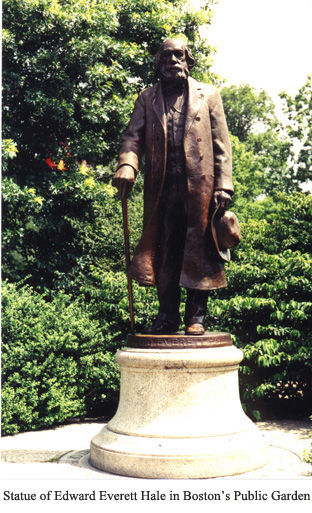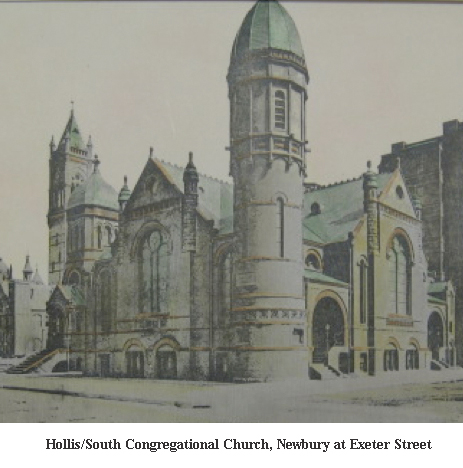Edward Everett Hale
Rev. Edward Everett Hale Proposes an Old-age Pension Plan
 In a ministry of 61 years (Unity Church in Northampton, South Congregational Church in Boston, Chaplain of the United States Senate), Edward Everett Hale was widely influential as a reformer, an organizer of charitable and ecclesiastical enterprises and a prolific writer.
In a ministry of 61 years (Unity Church in Northampton, South Congregational Church in Boston, Chaplain of the United States Senate), Edward Everett Hale was widely influential as a reformer, an organizer of charitable and ecclesiastical enterprises and a prolific writer.
His statements reflect some of his overarching concerns:
“The relief of the poor is the public duty of the private citizen. The old heathen reign of each for himself is at an end; for the dawn of the Sun of righteousness is beginning to dapple in that black sky. It is each for all; not he for himself, nor I for myself. In every life, it is a world of men and women. Being sons and daughters of God is the only way; and in that way we choose to journey.
“The beginnings of this change did not come as intellectual fact. They came by contagion. Love rules the camp, because a brave man makes others brave. A just man makes others just. A pure woman makes others pure. A faithful woman makes others faithful. An industrious woman makes others industrious. A hopeful woman makes others hope, and a loving woman makes others love. In this way, life enlivens life, love gives birth to love, truth compels truth.”
This philosophy is encapsulated in Hale’s development of the Lend-a-Hand Society. It is expressed in his Lend-a-Hand Song:
(Tune: Morning Light)
1) From city and from prairie, From every happy home,
To help the faint and weary, Our Father’s children come.
As far as sunlight reaches, As high as mountains stand
Our gladsome gospel teaches How all shall lend a hand.
2) The boys shall tell their mothers, The fathers tell the boys,
The sisters tell their brothers, Till all the lands rejoice.
In ev'ry home of sorrow, Some loving comfort bring,
And something more tomorrow, While all unite and sing.
3) In ev’ry home of sorrow, Some loving comfort bring,
And something more tomorrow, While all unite and sing,
Look upward to his heaven, Look forward at his call,
And use the strength he’s given, To lend a hand to all.
 Hale’s motto is caught up in the statement: “Look up and not down; look forward and not back; look out and not in, and Lend a Hand!”
Hale’s motto is caught up in the statement: “Look up and not down; look forward and not back; look out and not in, and Lend a Hand!”
Hale’s explanation: “Faith looks upward; Hope forward; Love onward, and lends a hand.”
Is it surprising that he would combine this compassion with volunteerism, and with a proposal for government legislation to elevate his outlook into one of the first public statements for a universal oldage pension as a public entitlement?
In 1902, he wrote: “There is now no place in our working order for old men. England and New Zealand caught hold of this truth before we did in America. We do have an admirable arrangement of ‘benefit societies’ in this country. And while some are craftily managed, some are so badly managed that the whole thing goes into insolvency. Insurers take only the people who won’t die or who are insured against sickness or disease. Now, in America, we are used to equality. Before the law all of us are equal. We cannot be drawing delicate lines between the lower middle class and the upper middl class which the English so delight in. To our simple political economy, all men are sons of God and all women are daughters of God.”
With this introduction, Hale comes to the point: “It would not be difficult in America to provide a modest life-pension for every aged man and woman. I am writing in Massachusetts, where the construction of a system of pensions is easier, because we maintain our old-fashioned system of poll-tax, a tax into which every man who is more than eighteen years of age puts two dollars a year into the treasury of the State.
“Now, if that money were to be collected and paid instead to a grandfather or a grandmother, they could have at age sixty-five one hundred dollars a year to their good. And, all of these old people would be better cared for in the homes of old neighbors, or old friends, or very possibly of sons, or of daughters, who would receive them and take charge of them. This ready money would cover all of the extra expense. A very little money goes a great way in the average household of an American. This pension system also has the great advantage that it maintains life in homes, and that it abates the necessity for great institutions or asylums.” [NB - In 1964, the 24th amendment to the US Constitution abolished the poll tax.]
Biographical briefs: Edward Everett Hale, Unitarian Clergyman, DD, LLD (1822-1909). Entered Harvard, age 13; AB, Phi Beta Kappa, class poet; MA, STD. Minister, Church of Unity (Unitarian), Northampton, 1846-56. Received a ministerial call from First Church Boston. He declined. Minister, South Congregational Church, Boston 1856-1900. Chaplain, United States Senate, 1903-09. Founded Lend-a-Hand Society in 1843. Father, Nathan Hale, ownereditor of the Boston Daily Advertiser. Mother, Sarah Preston Everett, from a family of eminent Unitarians. Wife, Emily Balkwin Perkins; Daughter, Ellen Day Hale, artist. Uncle, Edward Everett, Congressman, Senator, and Governor.
Selected writings: The Man without a Country, (1863) a call to patriotism in a war-ravaged country. The portrait of a service man who damns the United States, but does not realize what he has lost until he is forever banished from his native land. A New England Boyhood (Autobiography, 1893); The Christian Duty to Emigrants; The Story of Massachusetts (1891); If Jesus came to Boston (the social gospel); How to conquer Texas before Texas conquers us. (Supporting Texas’ fight to enter the Union.)
Hale’s ‘trinity’: The Father, the Son, and the Spirit of Truth.
Hale’s words: “The institution of Sunday, if it is to be maintained at all, will be maintained for the nobler purposes of higher life.”
As Unitarian Chaplain of the Senate, he was asked, “Do you pray for the Senators, Dr Hale?” His reply: “No, I look at the Senators and pray for the country.”
WIKIPEDIA